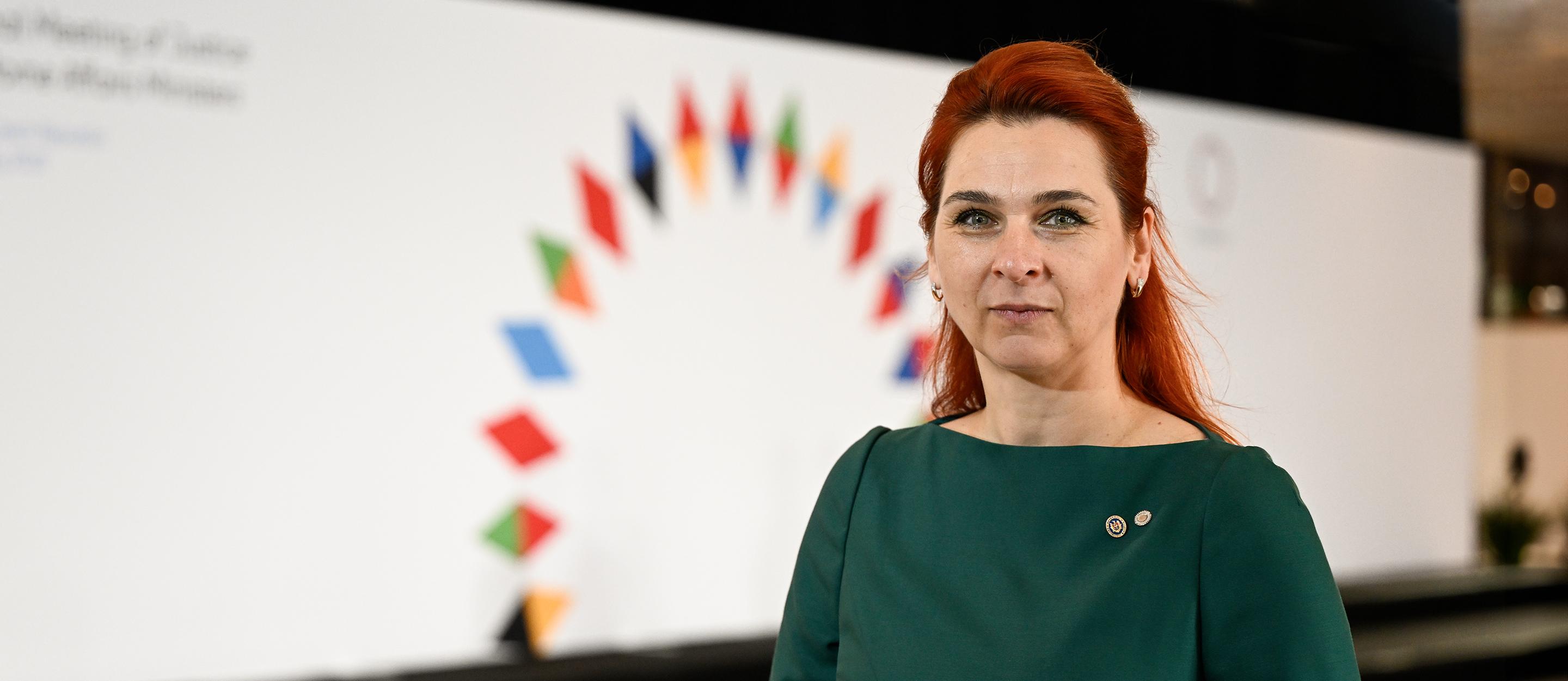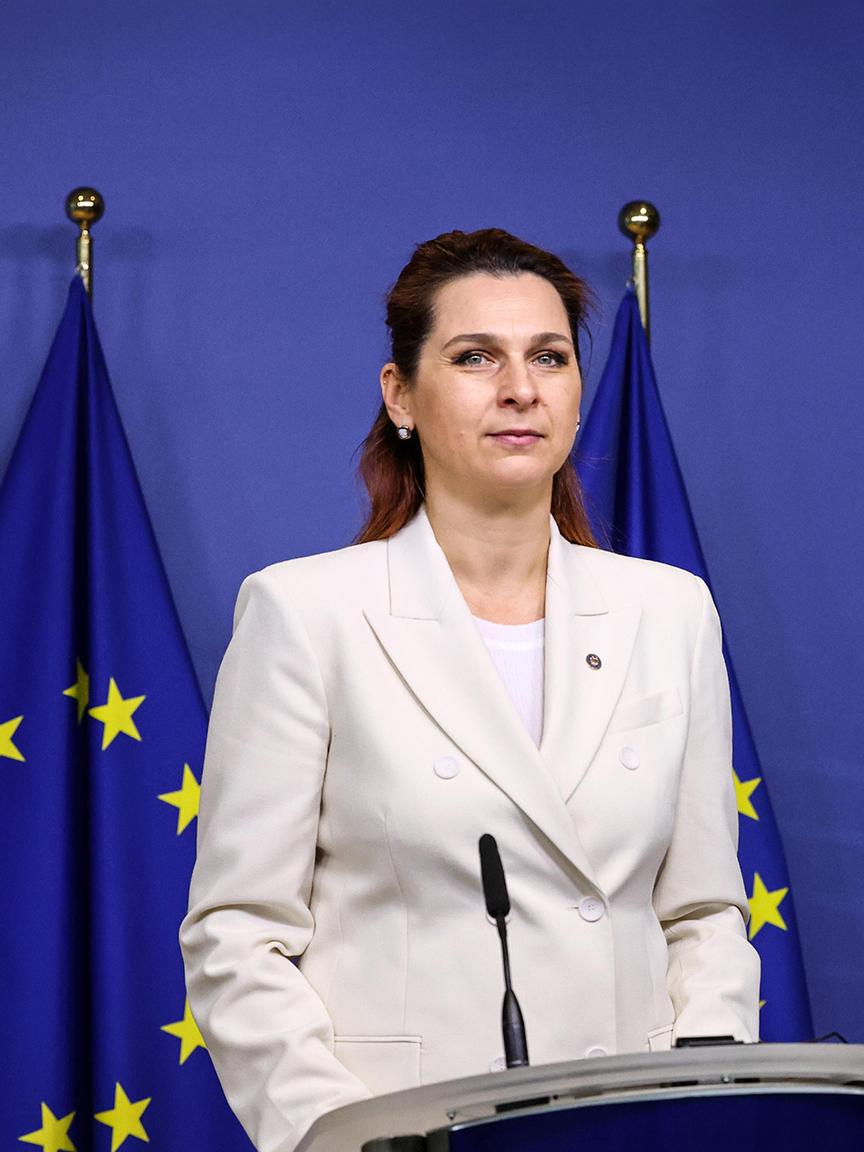Since 2023, GIZ has been working on behalf of the German Federal Foreign Office to support the Moldovan Government in making society more resilient to disinformation. The Moldovan Government sees the new Centre for Strategic Communication and Countering Disinformation as a tool to counter the spread of fake news. GIZ is advising Moldovan partners on developing crisis communication procedures. This involves drawing up communication plans and supporting test campaigns to improve the government’s target group-specific approach. GIZ is also training government experts and managers to enable them to better identify, analyse and monitor misinformation.
 dpa
dpa
‘Information manipulation and interference are undermining our democracies’
How is Moldova countering the threat posed by complex disinformation and foreign influence campaigns? Former Minister of Internal Affairs in Moldova Ana Revenco shares some insights into strategies and examples of international cooperation.
Ms Revenco, to what extent have fake news campaigns influenced your country since the start of Russia’s war of aggression against Ukraine?
Disinformation and foreign interference have increased massively since the start of Russia’s war of aggression in Ukraine and now pose a direct threat to our national security. Russia is the greatest external threat to our country’s democracy and internal security. Russian and domestic disinformation campaigns are being used to unsettle and split Moldovan society, to undermine our democracy and derail our accession to the European Union.
What misinformation is emerging in the context of Moldova’s accession to the European Union and how are you countering it?
A common narrative is that Moldova will lose its sovereignty if it joins the EU. Another one is that the EU is in decline on the brink of collapse. The latest and most aggressive narrative is that the EU means war. We counter this misinformation with a strong communication strategy that stresses the benefits of EU membership, such as economic freedoms, development opportunities, security and political stability. Our message is that the EU brings lasting peace and prosperity.
What role does social media play in the spread of disinformation?
Social media is a double-edged sword. On the one hand, it enables fast and broad-based communication but, on the other hand, it can easily be misused to spread misinformation. Lately we have seen Russia and its local proxies conducting aggressive disinformation campaigns on social networks. They are often AI-enabled to reach a wider audience.
Our approach here is to work with platform operators to develop guidelines designed to make it harder to spread misinformation. We also promote initiatives that help people to better gauge the credibility of online information and critically evaluate content.
What measures are you taking to counteract disinformation campaigns?
We are focusing on making our society more resilient through education and awareness raising. Part of this approach involved setting up the Centre for Strategic Communication and Countering Disinformation, which concentrates on providing clear and transparent information to enhance public awareness.
We are supporting education and awareness raising work in society through partnerships with media organisations, educational institutions, academia and civil society. Encouraging people to cultivate critical thinking skills to enable them to better recognise fake news is paramount. All our measures are aimed at empowering the population to evaluate information independently and defend themselves against manipulative content.
The centre is also active in research, analysing the latest trends and tactics in the disinformation landscape. We incorporate the findings into our strategies, which enables us to be proactive in responding to new threats. By working with international experts and partners, we can ensure that our measures are state of the art and at the same time in line with Moldova’s democratic values and legal framework.
 dpa
dpa
Ana Revenco is director of the Centre for Strategic Communication and Countering Disinformation in the Republic of Moldova.
Who are your partners in the fight against disinformation?
We have several international partnerships, especially with EU countries and organisations such as GIZ that provide us with technical and financial support. Our cooperation with GIZ is a key element of our strategy to strengthen cyber security and combat disinformation. For example, in setting up the Centre for Strategic Communication and Countering Disinformation, the German Government not only provided funding, but also the expertise that enables us to develop effective communication strategies and educational programmes.
We are working together to organise workshops and training courses for civil servants, media representatives and members of civil society to teach them about the dangers of disinformation and develop practical skills for dealing with disinformation campaigns.
What do you think of the cooperation between Moldova and the European Union regarding the upcoming EU referendum in Moldova?
The EU’s support is crucial for our democratic development and our preparations for the referendum. The EU has not only provided financial and technical support but also strategic advice to ensure that our referendum is transparent and fair. This cooperation shows how international solidarity can make a concrete contribution to strengthening our social and political structures.
What are Moldova’s long-term goals in the fight against disinformation and foreign interference?
In the long term, Moldova aims to develop an informed and resilient society that is able to recognise and combat disinformation on its own. International cooperation is essential here, as fake news knows no borders and is often promoted and spread by external actors. By exchanging information with our partners, especially Germany and other EU countries, we are developing our capacities and building a robust network that helps to make our information environment secure.